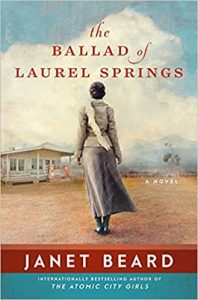Homecoming Through Songs
Homecoming Through Songs
 By Janet Beard
By Janet Beard
My new novel The Ballad of Laurel Springs is about many things but most personally to me, it’s about the place where I am from. I have fictionalized, changed the details of, and smushed together specific places, but anyone familiar with Sevier County, Tennessee should recognize it in the book. I grew up at the edge of the Great Smoky Mountains National Park surrounded by natural beauty and a unique cultural heritage. My childhood was spent exploring Appalachian peaks, dense forests, steep valleys, and tumbling rivers, as well as the oddities and attractions of a burgeoning tourist town. I heard the music and stories of the region celebrated, while also witnessing a distorted vision of that culture being commodified and marketed to visitors.
Despite the splendor of the landscape, I often longed to be somewhere more urban or suburban, like the “normal” America I saw on TV or in movies, where people spoke with bland accents and had little to no experience with shotguns. When the time came, I was eager to leave East Tennessee and see more of the world. I chose to go to college in New York City, which felt just about as far from where I’d grown up as possible.
Not long after I graduated from college far away from my Tennessee mountain home, I learned that a girl I’d gone to elementary school with, along with her boyfriend, murdered another one of our other classmates. It had been a small rural school, so we all knew each other well, and the news was shocking and strange. Then a few years after that, I heard about a girl I’d gone to high school with in another nearby town whose husband murdered her younger lover in a fit of rage. The stories were alarming, terrible, and not at all straightforward, in the conflicting ways that victimhood, gender, and poverty had affected the awful outcomes.
At first, I filed them away as dark anecdotes about my Southern Gothic roots. But I kept returning to them, with questions. And for me, questions are the best place to start a novel. I thought back to the Appalachian folklore I was raised on, in particular the folk songs. Music has always been an essential part of the local culture. I heard songs that had been passed down in my own family, and had also watched as our own hometown country music star Dolly Parton returned to both commemorate and sell tourists on her vision of Appalachian culture when she opened her theme park Dollywood.
Certain songs in particular had always fascinated me, as a kid with a love of the macabre. Murder ballads have been cautioning and titillating listeners for centuries with stories of young women being violently killed. Listening and relistening my questions began to crystallize. Why do we tell these same stories again and again? Are they universal or specific to this region? How do the songs endure while also transforming with each rendition? How do the stories we tell about women and violence reflect and affect the culture? Do these timeworn songs relate to the contemporary crimes of my classmates?
My way towards answering these questions was to write. I began telling the stories of women, in some ways like my classmates, in other ways not, but all dealing with the effects of violence and misogyny in one way or another. I decided to look at multiple generations to see how each generation’s present trauma has been predicted by past events, as well as how the stories and songs we share about those events affect us. Each chapter exists fully in its present moment but is inexorably tied to the events of the past and future. Through it all, the folksongs remain, bonding one generation to the next.
As The Ballad of Laurel Springs took shape, I dug deep into the songs, listening to as many recordings as I could, and selecting a handful of my favorites that would inspire each chapter of the book. Sometimes the songs are literally part of the story. Each generation claims that either the murder ballad ‘Pretty Polly’ or another ‘The Knoxville Girl’ was written about their relative who was killed in a place called Laurel Springs. Other songs are more inspiration, like ‘The Wayfaring Stranger,’ which takes on particular significance for a woman whose husband returns after a long disappearance, or ‘Little Sparrow,’ which becomes a nickname for her granddaughter who longs to fly away from the mountains.
Since flying away myself, I have never returned to live in the place where I grew up, though I visit often. Sometimes it feels as though the farther I get from my upbringing in time and space, the larger it looms in my imagination. And now I appreciate the elements that made my home not quite normal and turned me into the person and writer that I am today. I have reached toward answers to my many questions about the place in The Ballad of Laurel Springs. The culture is complicated, and I have tried to reflect its complexity. I write about the darkness, while also honoring the rich beauty of its traditions that can be heard in the moan of a fiddle, the plink-plonk of a banjo, and the vibrato of a woman’s voice singing ancient words in a mountain drawl.
—
ABOUT JANET BEARD
Born and raised in East Tennessee, Janet Beard studied screenwriting at NYU and went on to earn an MFA in creative writing from The New School. She is the bestselling author of The Atomic City Girls and The Ballad of Laurel Springs. She currently lives in Columbus, Ohio.
Connect with Janet!
THE BALLAD OF LAUREL SPRINGS
 From the internationally bestselling author of The Atomic City Girls, a provocative novel set in eastern Tennessee that “explores the legacies—of passion and violence, music and faith—that haunt one family across the generations” (Jillian Medoff, author of This Could Hurt).
From the internationally bestselling author of The Atomic City Girls, a provocative novel set in eastern Tennessee that “explores the legacies—of passion and violence, music and faith—that haunt one family across the generations” (Jillian Medoff, author of This Could Hurt).
Ten-year-old Grace is in search of a subject for her fifth-grade history project when she learns that her four times-great grandfather once stabbed his lover to death. His grisly act was memorialized in a murder ballad, her aunt tells her, so it must be true. But the lessons of that revelation—to be careful of men and desire—are not just Grace’s to learn. Her family’s tangled past is part of a dark legacy in which the lives of generations of women are affected by the violence immortalized in folksongs like “Knoxville Girl” and “Pretty Polly” reminding them always to know their place—or risk the wages of sin.
Janet Beard’s stirring novel, informed by her love of these haunting ballads, vividly imagines these women, defined by the secrets they keep, the surprises they uncover, and the lurking sense of menace that follows them throughout their lives even as they try to make a safe place in the world for themselves. “This inspired story of Appalachian folklore” (Publishers Weekly) will move and rouse you.
BUY HERE
Category: On Writing
























